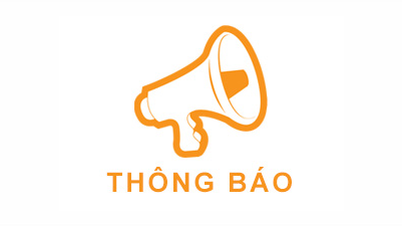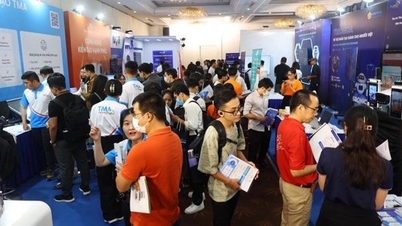On the evening of September 11, the VNCERT Center under the Department of Cyber Security and High-Tech Crime Prevention - Ministry of Public Security issued a notice stating that it had received a report of a "cyber security incident and signs of personal data violation" occurring at the National Credit Information Center CIC on September 10.
This unit has coordinated with enterprises providing network information security services and CIC, functional units of the State Bank to verify incidents, response techniques, collect data and evidence.
"Initial verification results show signs of cybercrime attacks and intrusions to steal personal data. The amount of illegally acquired data is being continuously counted and clarified," the announcement said.
The incident quickly attracted public attention because CIC is the place that stores the largest credit data warehouse in the country, related to information of tens of millions of individual and organizational customers.
People's transactions and credit card information will not be affected by the incident.
Cyber security expert Ngo Minh Hieu (Hieu PC) - Director of Chongluadao.vn said that currently there is some information causing excessive panic/misinformation on the internet. However, everyone can rest assured. Because the bank does NOT send credit card information (card number, expiration date, CVV/CVC), OTP, customer password to CIC. Therefore, your transactions and credit card information will not be affected by this incident.

Through preliminary assessment, Vietnam's banking and credit system is still safe, well protected and operating stably.
However, according to the assessment, cybercriminals can take advantage of the incident to commit fraud. To ensure safety, Mr. Hieu recommends that people need to be absolutely vigilant against calls, messages, and emails impersonating banks, CIC, police agencies, etc.
Do not provide card number, expiry date, CVV/CVC, OTP, password to anyone under any circumstances.
Do not click on links in strange messages/emails, especially files with *.apk format…
Regularly monitor transaction history; if you detect any abnormalities, immediately contact the bank's Customer Service Center.
To be more careful in the future to avoid being duped, please always check any links at ai.chongluadao.vn and see more at dauhieuluadao.com - General rule slow down and verify!
Never give your password or OTP to anyone via phone, text message, or email.
On September 12, the Criminal Police Department (PC02) of Ho Chi Minh City Police issued a warning about possible increased fraud after the personal data leak at the National Credit Information Center (CIC).
According to PC02, the leaked data contains a lot of important information such as full name, ID card/CCCD number, bank account... This is a large data source that can be exploited by cybercriminals, creating more sophisticated scams.
The National Credit Information Center confirmed that there was a cyber attack with signs of illegal intrusion aimed at appropriating personal data.
Possible tricks include:
Impersonating bank employees, CIC officers or government agencies to call, text, or email to notify of “bad debt” or “verify information” in order to lure victims into providing passwords and OTP codes.
Selling "debt cancellation, card limit increase" services aimed at students and workers in urgent need of loans.
Impersonate relatives or agency leaders to request urgent money transfers.
Legal threats, claiming to be police, prosecutors, or court officials, accusing them of being involved in a “money laundering case”, then asking the victim to transfer money to a “safe account”.
Spreading SMS, email, Zalo messages containing malicious links to steal more personal data.
Groups that are vulnerable to being targeted include: students (easily deceived by student loans and part-time jobs), workers and civil servants (often receiving fake news about bad debts and credit), and older people who are less tech-savvy (easily believing calls impersonating banks and police).
PC02 recommends that people: Absolutely do not provide passwords or OTP codes to anyone via phone, text message, or email.
Do not click on strange links, only use the bank's official website and application.
When receiving unusual information, contact directly via hotline or go to bank headquarters or police for verification.
Students and workers do not believe in advertisements for "CIC debt cancellation" and "fast loans with 0% interest rate".
Families need to regularly remind and instruct the elderly on how to recognize fraud.
PC02 emphasized that after the largest data leak ever, cybercriminals have many conditions to commit fraud because they hold real information of people. Therefore, everyone needs to be more vigilant, update recommendations from police agencies, banks and mainstream media to protect assets.
CIC confirmed that the system is still operating normally and without interruption. Authorities also warned that exploiting, buying, selling or sharing leaked personal data is illegal and will be severely punished.
This incident is considered particularly serious, posing an urgent requirement for management agencies to strengthen coordination, consolidate defense capacity and protect the safety of the national credit data system.Source: https://khoahocdoisong.vn/chuyen-gia-khuyen-cao-canh-giac-lua-dao-sau-su-co-ro-ri-du-lieu-cic-post2149052879.html

























![[Photo] Off-road racing: Adventure sport, attractive tourism product](https://vphoto.vietnam.vn/thumb/1200x675/vietnam/resource/IMAGE/2025/9/14/45123bd29c884b64934da038d947d344)






































































Comment (0)